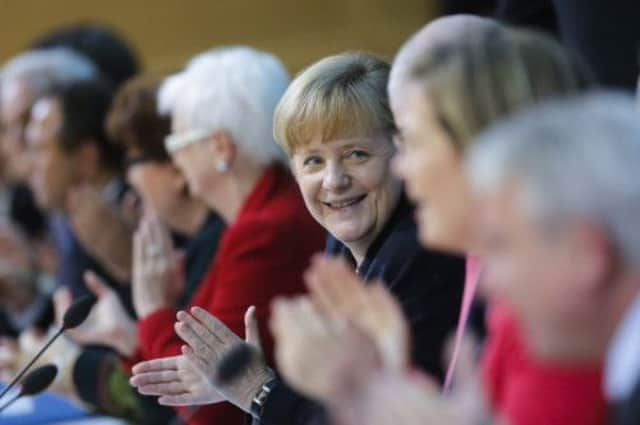‘Unlikely’ that Merkel will back German referendum


The idea was spelled out in a document put together by one of the working groups discussing policy compromises to enable the formation of a government between Angela Merkel’s conservatives and the centre-left Social Democrats (SPD).
It calls for referendums when new members join the European Union (EU), when powers are transferred from Berlin to Brussels and when Germany commits money at EU level – a shift that could severely limit Berlin’s ability to act swiftly in a crisis.
Advertisement
Hide AdAdvertisement
Hide AdThe proposal has yet to be approved by a larger coalition panel led by Mrs Merkel, and one senior member of her Christian Democrats (CDU) made clear yesterday that there was no consensus on the issue.
“As before, there are serious doubts about the introduction of referendums at the national level,” said Guenter Krings, a deputy leader for the party in parliament. “Representative democracy has proven itself in Germany, including on European decisions, and we want to stick with this.”
But the document underscores the unease among German parties – particularly in the Bavarian Christian Social Union (CSU) – with the democratic legitimacy of decisions to transfer competencies to the EU, and to financially support struggling partners during the euro crisis.
“The population should be asked directly on European policy decisions of special importance,” reads the document, produced by a domestic policy working group led by the CSU interior minister Hans-Peter Friedrich and Thomas Oppermann of the SPD.
“This would apply in particular when new member states are added, when important powers are to be transferred to Brussels, or when German finances are committed at EU level.”
While referendums are common in Ireland, Switzerland and some Scandinavian countries, Germany’s post-war constitution sets high hurdles for them, in part because plebiscites are blamed for helping Adolf Hitler’s rise to power.
Germany’s “Basic Law” only permits national referendums when changing the constitution or reshaping borders. German citizens had no vote on reunification in 1990. Nor were they given a direct say in the decision to replace the deutschmark with the euro.
At the height of the euro crisis in early 2012, when Germany’s Constitutional Court was voicing concerns about the legality of measures to curb the turmoil, there was a vigorous debate about changing the Basic Law.
Advertisement
Hide AdAdvertisement
Hide AdFinance minister Wolfgang Schaeuble said at the time that a referendum on closer European integration may be necessary “more quickly than I would have believed”.
A poll published in June of that year showed that 71 per cent of Germans favoured a direct vote on ceding more powers to EU authorities in Brussels.
But Mrs Merkel has always been cool on the idea, in part because of concern that referendums could fuel populist parties, such as Alternative for Germany, a new anti-euro movement that nearly won seats in the German parliament in a September election.
“I cannot believe that this will survive the coalition negotiations,” said Tanja Boerzel, a professor at Berlin’s Free University.
“The CSU has always pushed for referendums. I am not sure why the SPD agreed to this, maybe this is part of a bargaining strategy, something for the SPD to drop in return for something else. The CDU is certainly ambivalent, and I cannot believe Merkel will accept the proposal.”